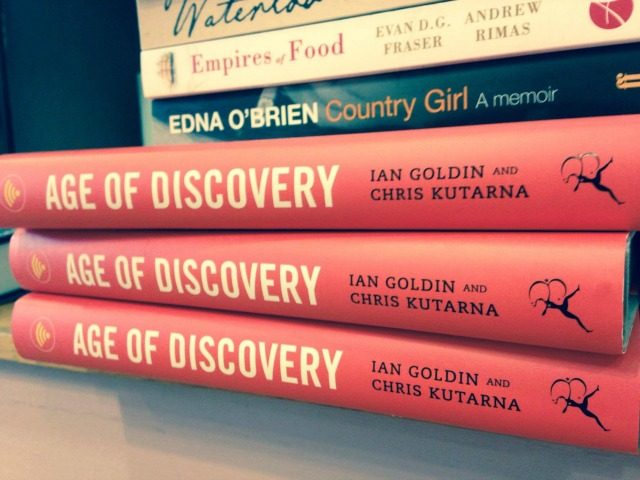Oxford University Professor Ian Goldin and Oxford Martin Fellow Chris Kutarna joined Breitbart News Daily SiriusXM host Stephen K. Bannon Tuesday to discuss their new book, titled “Age of Discovery: Navigating the Risks and Rewards of Our New Renaissance.”
Golden said, “We’re in a new Renaissance … whether that results in chaos or a much better world is the uncertainty,” adding that it’s a 50-50 proposition. As even the Amazon description offers, the authors contend that the forces that are colliding in the world today could move the world forward, or, in essence, usher in something of a new dark age:
Da Vinci, Galileo, Copernicus, Raphael, Michelangelo: These names recall an era in which an unprecedented rush of discovery broke through long-standing barriers of ignorance and connected the whole world, politically and economically, for the first time. We still think of such surges of human ingenuity as rare. But they don’t have to be. Today, for instance, our resources are better, our education is more advanced, and the pace of breakthrough innovation is doubling every two years. The same forces that converged then to spark genius and upend social order – great leaps in science, trade, migration and technology – are present again in our lifetime, with potentially even greater results.
In Age of Discovery, Oxford Professor Ian Goldin and Oxford Martin Fellow Chris Kutarna show how we can achieve our own golden age, given the will. But many of the factors that undid the first Renaissance are rising once again: warring ideologies, fundamentalism, climate change, pandemics. Can we weather the crises and seize the moment to leave the world a legacy it will still celebrate, 500 years later?
Professor Ian Goldin is professor of Globalisation and Development and director of the Oxford Martin School at the University of Oxford. Scientific American recently published a brief excerpt from the work. More is found at the link below:
Are We Living in a New Renaissance? – Two scholars speculate on how history may be repeating itself in this excerpt from their new book
If Michelangelo were reborn today, amidst all the turmoil that marks our present age, would he flounder, or flourish again?
Every year, millions of people file into the Sistine Chapel to stare up in wonder at Michelangelo Buonarroti’s Creation of Adam. Millions more pay homage to Leonardo da Vinci’s Mona Lisa. Through five centuries, we have carefully preserved such Renaissance masterpieces, and cherished them, as objects of beauty and inspiration.
But they also challenge us.
The artists who crafted these feats of genius five hundred years ago did not inhabit some magical age of universal beauty, but rather a tumultuous moment—marked by historic milestones and discoveries, yes, but also wrenching upheaval. Their world was tangling together in a way it had never done before, thanks to Gutenberg’s recent invention of the printing press (1450s), Columbus’s discovery of the New World (1492) and Vasco da Gama’s discovery of a sea route to Asia’s riches (1497). And humanity’s fortunes were changing, in some ways radically. The Black Death had tapered off, Europe’s population was recovering, and public health, wealth and education were all rising.
Genius flourished under these conditions, as evidenced by artistic achievements (especially from the 1490s to the 1520s), by Copernicus’s revolutionary theories of a sun-centered cosmos (1510s), and by similar advances in a wide range of fields, from biology to engineering to navigation to medicine. Basic, common-sense “truths” that had stood un- questioned for centuries, even millennia, were eroding away. The Earth did not stand still. The sun did not revolve around it. The “known” world wasn’t even half of the whole. The human heart wasn’t the soul; it was a pump. In mere decades, printing boosted the production of books from hundreds to millions per year, and these weird facts and new ideas traveled farther, faster than had ever been possible.
But risk flourished, too. Terrifying new diseases spread like wildfire on both sides of the now-connected Atlantic. The Ottoman Turks—backed by a “new” weapon, gunpowder—conquered the eastern Mediterranean for Islam in a stunning series of land and naval victories that cast a threatening gloom over all of Europe. Martin Luther (1483–1546) leveraged the new power of print to broadcast blistering condemnations of the Catholic Church, igniting religious violence continent-wide. The church, which had endured every challenge to its authority for over a thousand years to become the most important and pervasive authority in European life, split permanently under the strain.
Breitbart News Daily airs on SiriusXM Patriot 125 weekdays from 6:00 a.m. to 9:00 a.m. Eastern. The full interview is available below:

COMMENTS
Please let us know if you're having issues with commenting.